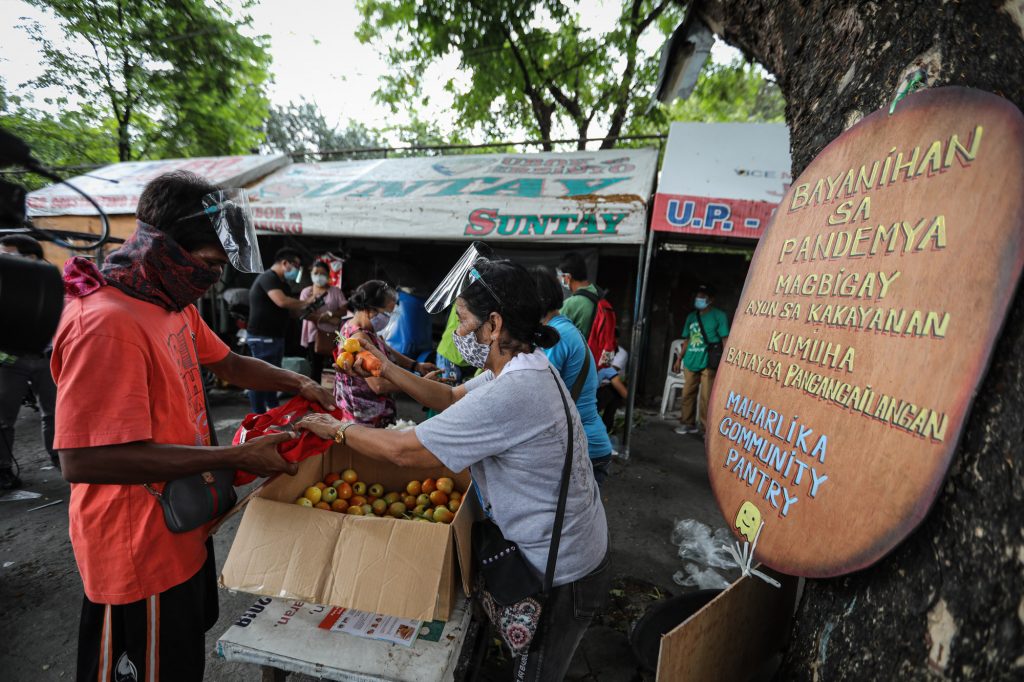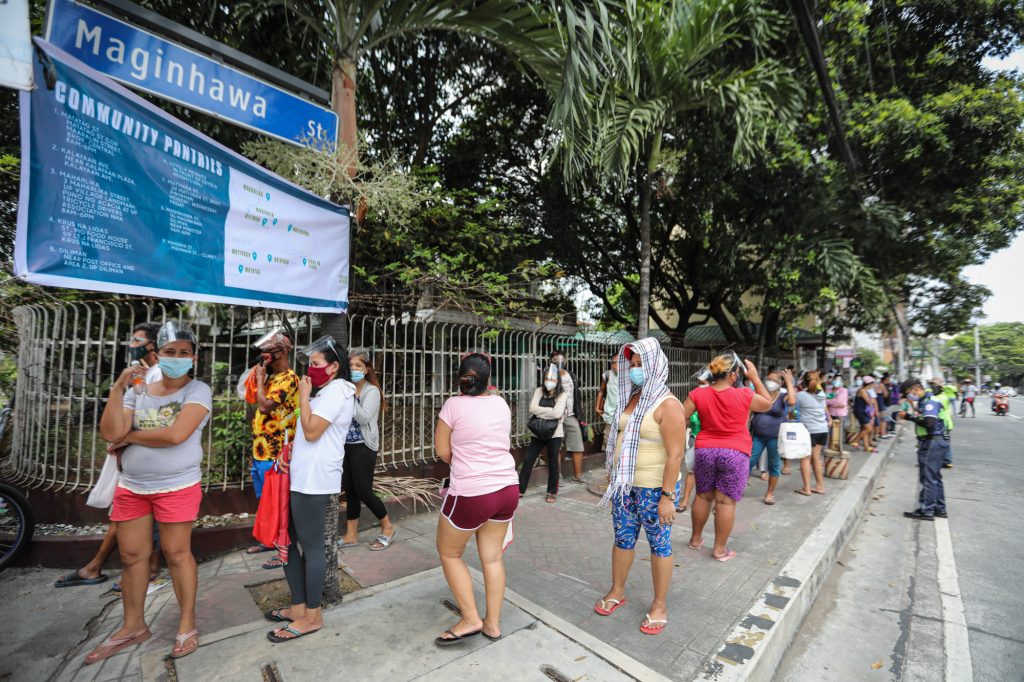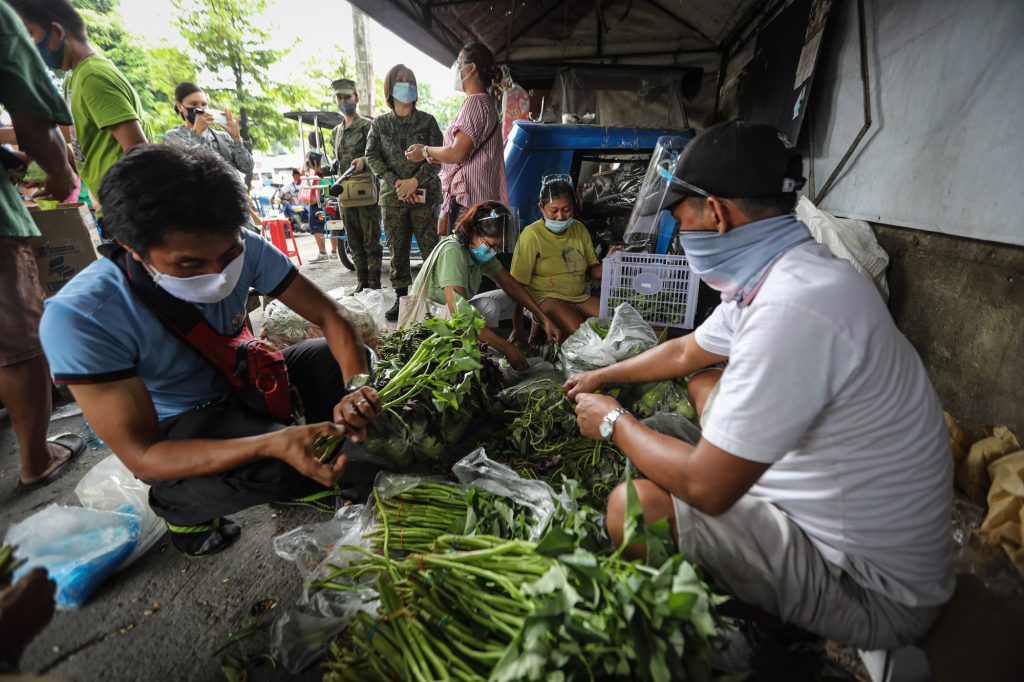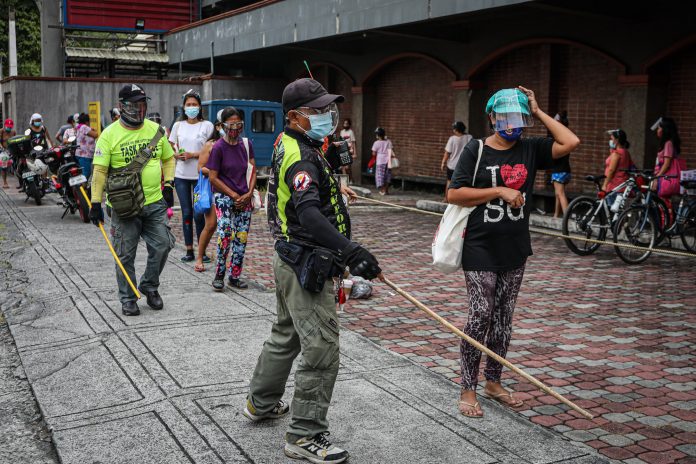A story goes that one typically humid April afternoon, mere seconds after the women volunteers of a community pantry in Quezon City called it a day, an old mother dropped by with her small plastic bag.
The volunteers were quick to say that the pantry is closed, and that she could visit again the morning next. The old mother, herself visibly poor and disadvantaged, smiled and handed over her plastic bag. It was a modest token of what she can contribute to the nationwide effort of community pantries to feed the poor.
It was a tale repeatedly displayed all over the country—by the ice cream vendor, a chicharron seller, several farmers of vegetables, indigent fisherfolk, recently even a band of soldiers, and a handful of police officers—the poorest of the poor donating what they can to feed those most affected by government inaction in the time of pandemic.
Lt. Gen. Antonio Parlade Jr. lost no time associating the movement to satanism and communism. His reason? He could not believe that such a coordinated and harmonized effort at compassion and empathy is possible in a country that has always been known for its hospitality.
In the Philippines, the cost of kindness is to be branded a terrorist.
And as a terrorist, the National Task Force for Ending Local Communist Armed Conflict (NTF-ELCAC) under Rodrigo Duterte sees sympathetic Filipinos as Public Enemy No. 1.
By now, it is apparent that this government cares little, if at all, for who is being kind to whom. Their two-dimensional idea of the dystopia they have created sees everyone as either “for them” or “against them,” depending on who’s agenda one is promoting. Any act of kindness shown to Filipinos is not one of them.
And since they’re not in the habit of prioritizing the public interest, as the drug war, the communist witch hunt, and the mishandling of the pandemic have long proven, anyone who’d be brave enough to convert kindness to actual food on the table to serve a long line of indigent communities is considered subversive.
It is thus incumbent for every Filipino to condemn in no uncertain terms this political shenanigan by Parlade, and say “No!” to the infrastructure of power which seeks to dismantle and criminalize the bayanihan spirit.

I, therefore, begin by saying “No!” to Duterte’s machinery of silence, to the Php19.1 billion anti-insurgency fund sourced from taxpayers which gives fangs and claws to the NTF-ELCAC. The call by senators to defund the task force, therefore, is an idea whose time has come. Sen. Joel Villanueva’s proposal to strip the task force of its funding should be the first step towards the group’s inevitable dissolution.
Parlade et. al. should also be held accountable for the Php19 billion in funds earmarked for its intelligence operations. For what good would Php19 billion do to an organization whose idea of intelligence gathering is the drawing up of charges based on social media posts? Where was the money spent?
Come to think of it, defunding the NTF-ELCAC is one thing, letting the organization carry on its warped ideology of abuse is another. I therefore say “No!” to Parlade’s leadership in the organization. He should be replaced immediately. Better yet, our lawmakers should rise to the occasion and dissolve the organization in its entirety, replacing it with a task force that would kickstart an effective pandemic response and developments projects in the poorest sections of the country.
The funds would’ve done wonders for the pandemic response, whose mediocre handling has pushed the nation within an infection bubble of roughly 8,000 to 10,000 daily, to say nothing of the food insecurity which has struck 59 million Filipinos earlier this year based on United Nation’s study.

Human Rights Watch Senior Philippines Researcher Carlos Conde said in this regard, that community pantries “have been an incredible demonstration of compassion of Filipinos at a time when, because of COVID and the Duterte administration’s perceived inadequate response to the pandemic, many poor families are suffering from lack of food and household resources.”
I likewise say “No!” to the unscrupulous branding of community food banks as allegedly part of “terrorist recruitment,” and to government claims that these acts of kindness compete with their programs to alleviate hunger during the pandemic.
What program is government talking about? To refresh their memory, community pantries sprung all over the country precisely to expose the gaping holes in government assistance. And this despite the latter’s accumulation of hundreds of billions in loans and donations supposedly allocated for the pandemic response.
If kindness and charity compete with the State’s agenda, one wonders what government’s true agenda might be.
I also say “No!” to supposed “Christians” decrying the community pantries as an example of faithlessness in God, citing Matthew 6:26-31, even reproaching people for “having little faith.” I’ve been made aware of churches—New Life in Kalibo, Throne of Grace Fellowship, and San Bartolome Parish Youth Ministry, among others—who chose rather to show the love of God through the example of feeding of the poor.
Whoever disparages the act of feeding, I recommend you reread your Bibles:
Whoever is generous to the poor lends to the Lord, and he will repay him for his deed (Proverbs 19:17). Whoever gives to the poor will not want, but he who hides his eyes will get many a curse (Proverbs 28:27). Whoever oppresses a poor man insults his Maker, but he who is generous to the needy honors him (Proverbs 14:31).
If you pour yourself out for the hungry and satisfy the desire of the afflicted, then shall your light rise in the darkness and your gloom be as the noonday (Isaiah 58:10). Whoever closes his ear to the cry of the poor will himself call out and not be answered (Proverbs 21:13). Is it not to share your bread with the hungry and bring the homeless poor into your house; when you see the naked, to cover him, and not to hide yourself from your own flesh? (Isaiah 58:7).
But if anyone has the world’s goods and sees his brother in need, yet closes his heart against him, how does God’s love abide in him? (1 John 3:17). And whoever gives one of these little ones even a cup of cold water because he is a disciple, truly, I say to you, he will by no means lose his reward” (Matthew 10:42).

It was to his disciples that Jesus said, “Sell your possessions, and give to the needy. Provide yourselves with moneybags that do not grow old, with a treasure in the heavens that does not fail, where no thief approaches and no moth destroys (Luke 12:33).
It is to the believer’s shame that community pantries sprung through the efforts of the poor because us, Christians, have forgotten the power which proves our faith and our hopes—love.
Verily I say unto you, inasmuch as ye have done it unto one of the least of these my brethren, ye have done it unto me (Matthew 25:40).
Lastly, I say “No!” to the infrastructure of disinformation, the outright lies, the creation of imagined and largely unforgivable narratives out to vilify the culture of bayanihan. Hate is not and will never be the country’s dominant culture, nor is this a matter of opinion.
These counterfeit narratives promote an “ideology of impotence,” as author Eduardo Galeano once called it, forcing society into embracing fatalistic tendencies, hopelessness, despair. It fosters amnesia, regulates universal truths as mere debatable topics of discussion, leaving no place to anchor our assurances and our confidence both in ourselves and others.
Our sure defiance lies in acknowledging that Filipinos have never been anything but a warm and hospitable people, generous to a fault, often giving more than what is necessary. Such generosity, I believe, is the Filipino’s birthright, the one heritage that assures our survival.
Lastly, I say “No!” to greed, to corruption big and small, to the selling of national patrimony, and a political entitlement that promotes miserliness. In the end, those guilty of these crimes must answer to the charges of betrayal of the Constitution.
The world as we knew it is in the middle of an upheaval, forcing everyone to rethink their place in the scheme of things. I’m more than glad that Filipinos, in their efforts to stay alive, chose the way of empathy and compassion.
It’s the only weapon powerful enough to crush fear. And to this I say a resounding “Yes!”
Joel Pablo Salud is an editor, journalist and the author of several books of fiction and political nonfiction. He is currently the chair of the Philippine Center of International PEN’s Writers in Prison Committee. The views and opinions expressed in this article are those of the author and do not necessarily reflect the official editorial position of LiCAS.news.









